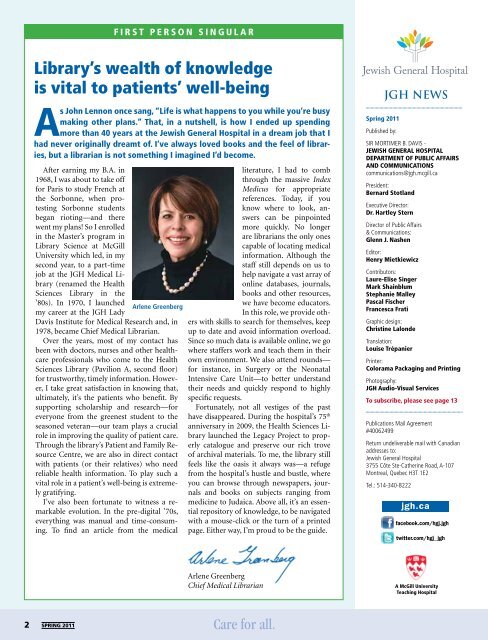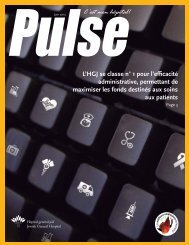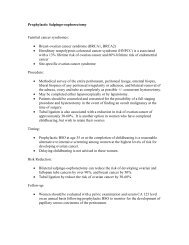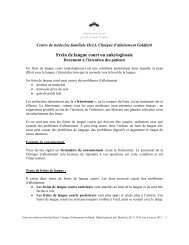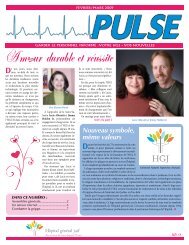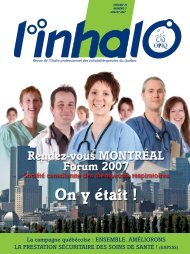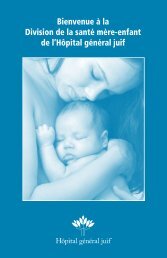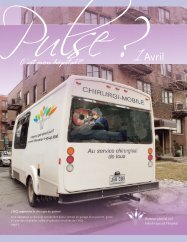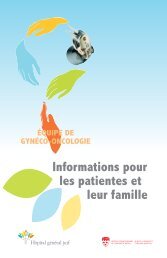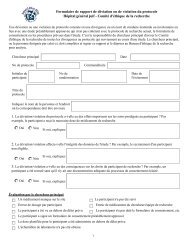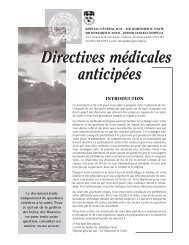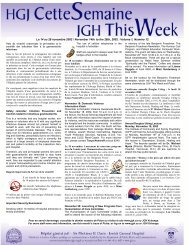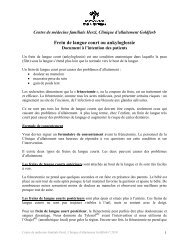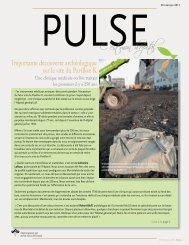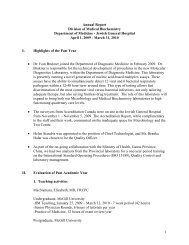No appointment? No problem!
No appointment? No problem!
No appointment? No problem!
Create successful ePaper yourself
Turn your PDF publications into a flip-book with our unique Google optimized e-Paper software.
2 spriNG 2011<br />
F I R S T P E R S O N S I N G U L A R<br />
Library’s wealth of knowledge<br />
is vital to patients’ well-being JGh news<br />
A<br />
s John Lennon once sang, “Life is what happens to you while you’re busy<br />
making other plans.” That, in a nutshell, is how I ended up spending<br />
more than 40 years at the Jewish General Hospital in a dream job that I<br />
had never originally dreamt of. I’ve always loved books and the feel of libraries,<br />
but a librarian is not something I imagined I’d become.<br />
After earning my B.A. in<br />
1968, I was about to take off<br />
for Paris to study French at<br />
the Sorbonne, when protesting<br />
Sorbonne students<br />
began rioting—and there<br />
went my plans! So I enrolled<br />
in the Master’s program in<br />
Library Science at McGill<br />
University which led, in my<br />
second year, to a part-time<br />
job at the JGH Medical Library<br />
(renamed the Health<br />
Sciences Library in the<br />
’80s). In 1970, I launched<br />
Arlene Greenberg<br />
my career at the JGH Lady<br />
Davis Institute for Medical Research and, in<br />
1978, became Chief Medical Librarian.<br />
Over the years, most of my contact has<br />
been with doctors, nurses and other healthcare<br />
professionals who come to the Health<br />
Sciences Library (Pavilion A, second floor)<br />
for trustworthy, timely information. However,<br />
I take great satisfaction in knowing that,<br />
ultimately, it’s the patients who benefit. By<br />
supporting scholarship and research—for<br />
everyone from the greenest student to the<br />
seasoned veteran—our team plays a crucial<br />
role in improving the quality of patient care.<br />
Through the library’s Patient and Family Resource<br />
Centre, we are also in direct contact<br />
with patients (or their relatives) who need<br />
reliable health information. To play such a<br />
vital role in a patient’s well-being is extremely<br />
gratifying.<br />
I’ve also been fortunate to witness a remarkable<br />
evolution. In the pre-digital ’70s,<br />
everything was manual and time-consuming.<br />
To find an article from the medical<br />
literature, I had to comb<br />
through the massive Index<br />
Medicus for appropriate<br />
references. Today, if you<br />
know where to look, answers<br />
can be pinpointed<br />
more quickly. <strong>No</strong> longer<br />
are librarians the only ones<br />
capable of locating medical<br />
information. Although the<br />
staff still depends on us to<br />
help navigate a vast array of<br />
online databases, journals,<br />
books and other resources,<br />
we have become educators.<br />
In this role, we provide others<br />
with skills to search for themselves, keep<br />
up to date and avoid information overload.<br />
Since so much data is available online, we go<br />
where staffers work and teach them in their<br />
own environment. We also attend rounds—<br />
for instance, in Surgery or the Neonatal<br />
Intensive Care Unit—to better understand<br />
their needs and quickly respond to highly<br />
specific requests.<br />
Fortunately, not all vestiges of the past<br />
have disappeared. During the hospital’s 75 th<br />
anniversary in 2009, the Health Sciences Library<br />
launched the Legacy Project to properly<br />
catalogue and preserve our rich trove<br />
of archival materials. To me, the library still<br />
feels like the oasis it always was—a refuge<br />
from the hospital’s hustle and bustle, where<br />
you can browse through newspapers, journals<br />
and books on subjects ranging from<br />
medicine to Judaica. Above all, it’s an essential<br />
repository of knowledge, to be navigated<br />
with a mouse-click or the turn of a printed<br />
page. Either way, I’m proud to be the guide.<br />
Arlene Greenberg<br />
Chief Medical Librarian<br />
Care for all.<br />
Spring 2011<br />
Published by:<br />
SIR MORTIMER B. DAVIS -<br />
JEWISH GENERAL HOSPITAL<br />
DEPARTmENT OF PUBLIC AFFAIRS<br />
AND COmmUNICATIONS<br />
communications@jgh.mcgill.ca<br />
President:<br />
Bernard Stotland<br />
Executive Director:<br />
Dr. Hartley Stern<br />
Director of Public Affairs<br />
& Communications:<br />
Glenn J. Nashen<br />
Editor:<br />
Henry mietkiewicz<br />
Contributors:<br />
Laure-Elise Singer<br />
mark Shainblum<br />
Stephanie malley<br />
Pascal Fischer<br />
Francesca Frati<br />
Graphic design:<br />
Christine Lalonde<br />
Translation:<br />
Louise Trépanier<br />
Printer:<br />
Colorama Packaging and Printing<br />
Photography:<br />
JGH Audio-Visual Services<br />
To subscribe, please see page 13<br />
Publications Mail Agreement<br />
#40062499<br />
Return undeliverable mail with Canadian<br />
addresses to:<br />
Jewish General Hospital<br />
3755 Côte Ste-Catherine Road, A-107<br />
Montreal, Quebec H3T 1E2<br />
Tel.: 514-340-8222<br />
jgh.ca<br />
facebook.com/hgj.jgh<br />
twitter.com/hgj_ jgh<br />
A mcGill University<br />
Teaching Hospital


